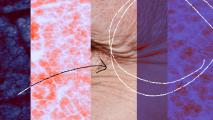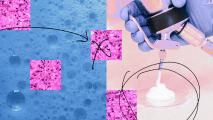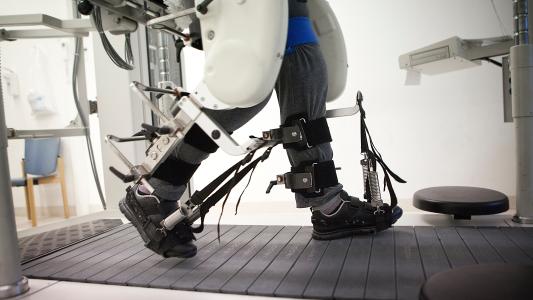New “super melanin” protects and heals skin
Scientists at Northwestern University have developed a synthetic melanin that’s even better at protecting the skin and healing damage than the natural kind.
The challenge: Melanin — a pigment found naturally in our skin, hair, and eyes — is your body’s natural defense against damage from sunlight, air pollution, and other environmental conditions.
The amount of melanin found naturally in your skin might not be enough to protect you from everything, though — too much time in the sun or contact with a caustic chemical could still leave you with a painful burn.
“It’s biocompatible, degradable, nontoxic, and clear when rubbed onto the skin.”
Nathan Gianneschi
Super melanin: Scientists at Northwestern University have now developed a synthetic melanin that can be applied to the skin as a cream to prevent or heal damage.
Rather than trying to create a perfect replica of the melanin naturally produced in our skin (which is molecularly unstable and hard to study), they engineered this kind to be better at hunting down and neutralizing skin-damaging molecules called “free radicals” and absorbing heavy metals and toxins.
“It’s like super melanin,” said co-corresponding author Nathan Gianneschi. “It’s biocompatible, degradable, nontoxic, and clear when rubbed onto the skin. In our studies, it acts as an efficient sponge, removing damaging factors and protecting the skin.”
The impact: When they tested the synthetic melanin as a sunscreen, the researchers found that the cream would sit on top of the skin — rather than being absorbed into it — and protect it from damage.
This suggests it could potentially be useful as an addition to sunscreens or other skincare products. The researchers think it could potentially protect the skin of cancer patients undergoing radiation therapy, too.
“The treatment has the effect of setting the skin on a cycle of healing and repair.”
Kurt Lu
To see whether it could help heal damage, the scientists anesthetized mice and burned their skin with a chemical. They then applied their synthetic melanin to the burns of some of the mice 2 hours, 1 day, and 2 days later. Other animals were left untreated.
The burns of the treated mice were up to 50% smaller than those of the controls and healed faster: 10-12 days compared to more than 16 days.
The scientists also used a chemical to create blisters on 20 human skin tissue samples. A few hours later, they applied their synthetic melanin to half of the samples. Over the next few days, those healed much faster than untreated samples.
“The treatment has the effect of setting the skin on a cycle of healing and repair, orchestrated by the immune system,” said co-corresponding author Kurt Lu.
Looking ahead: The Northwestern team has already completed a trial showing that the synthetic melanin doesn’t irritate human skin — a key requirement for any kind of topical product. They’re now working toward trials to test its efficacy as a treatment for skin injuries and burns.
“Such a relatively simple concept can continue to be advanced,” said Gianneschi. “If we can impact people’s lives with something like that, that’s an excellent outcome.”
We’d love to hear from you! If you have a comment about this article or if you have a tip for a future Freethink story, please email us at [email protected].






